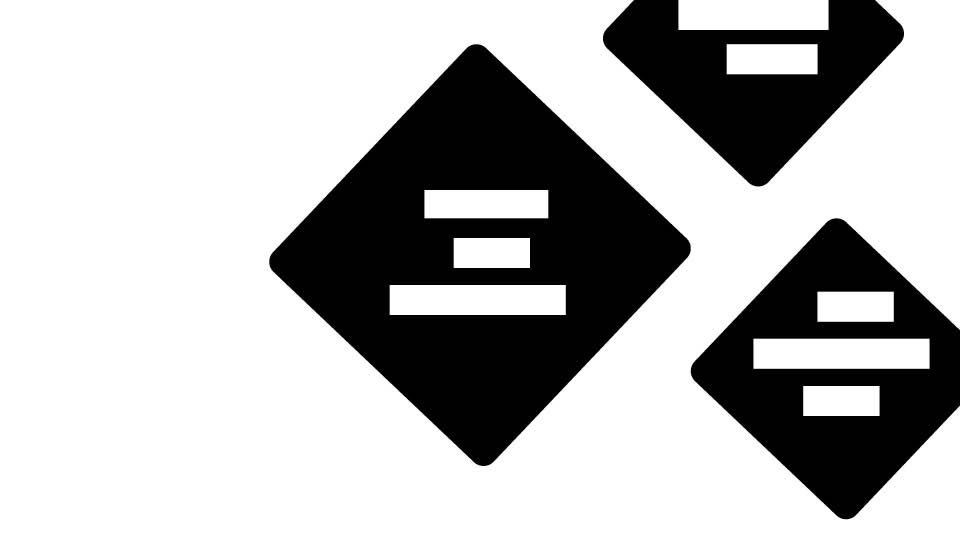Around 11 p.m. one night in November 2000, 16-year-old Allis Ozornia felt a sharp pain in her abdomen. By 8 a.m. the next morning, half of her reproductive system had been surgically removed.
When Allis first mentioned the pain to her mom earlier that day, she wasn’t alarmed: “Oh mija, this is your period. You’re getting cramps.” After Allis fainted, they went to the hospital, where “almost everyone [she] interacted with” asked if she was pregnant. She knew how irrelevant the question of pregnancy was for her, and she tried to communicate that to the doctors. “I came out shortly after my recovery…and I went full-force lesbian.”
As her doctor approached her with a second pregnancy test and a raised eyebrow, Allis also knew that “something was wrong.” Looking back, Allis now understands that the doctor’s refusal to listen reduced her medical case to a stereotype of Latine people. “To him, I was just a pregnant border teen,” Allis says. “That was my first experience in not being heard by medical professionals.”
After her pregnancy tests came back negative, her doctor found a tumor on her right ovary and told her that he would perform an emergency hysterectomy. “I was precocious enough to understand that this meant that I wasn’t going to be able to have babies.” This is when the hocicona in Allis kicked in. Her mom’s nickname for her, hocicona, literally translates to “blabbermouth.” Allis explains, “I have opinions and I say them.” Allis insisted that she wanted to have children, first explaining, then crying, then yelling, while her doctor stared blankly over his clipboard.
An hour or so later he returned with a new plan: they would remove only half of her reproductive system. He didn’t explain why the surgery was necessary, what would be removed, or what steps Allis would need to take to heal. She woke up the next day with a “gash that ran from the top of [her] vaginal wall to [her] belly button.”
Allis’ advocacy for herself that night in the emergency room ensured that the decision to have or not have children remained hers alone. For Allis, the ability to retain the power of decision-making in matters of reproductive healthcare defines reproductive justice. In 2013, she started advocating for her community in San Antonio, Texas. Her work as a doula, a community healer, focused on equipping patients with the knowledge they need to ensure their consent to medical procedures is informed.
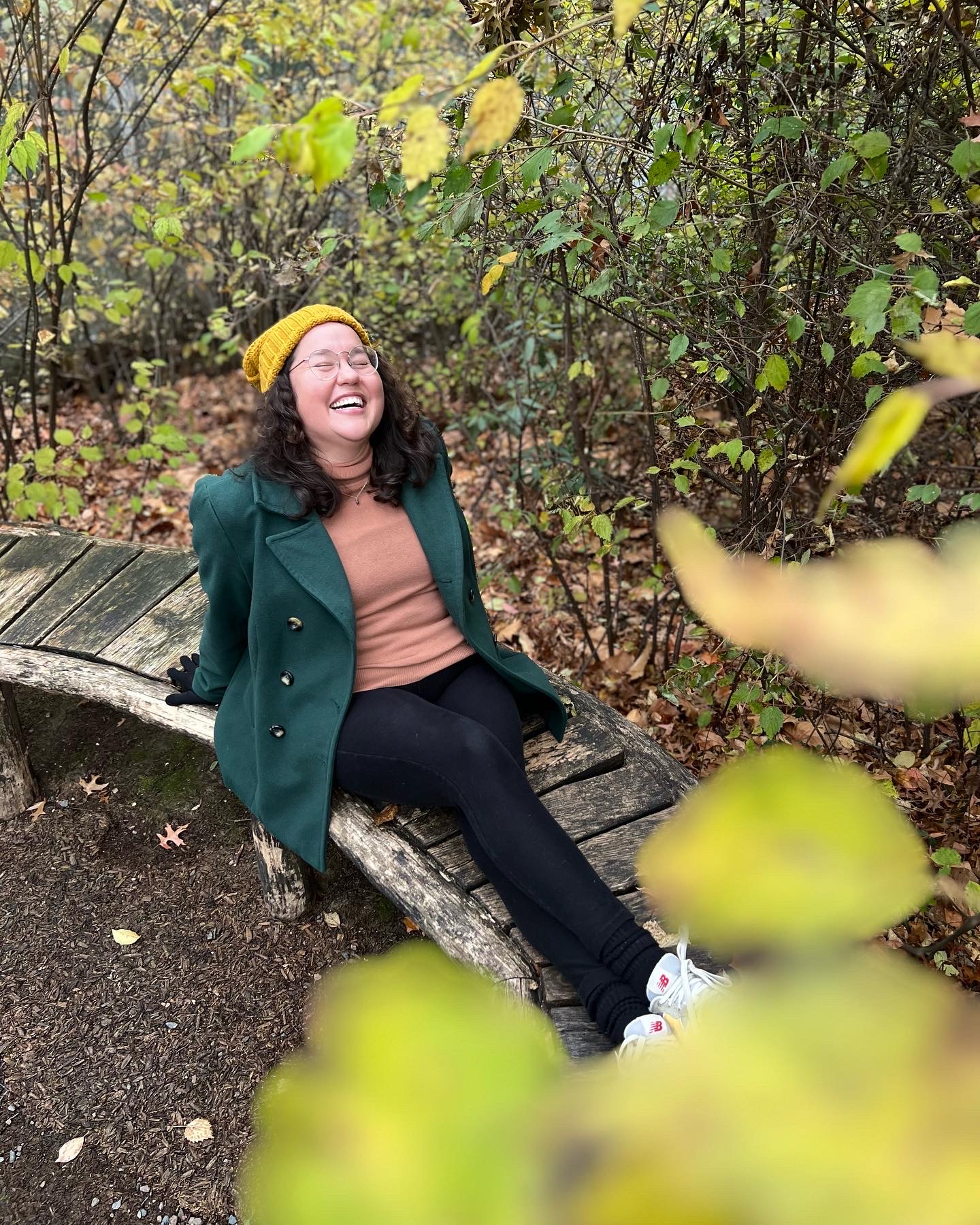
Allis at Central Park during November break, 2022.
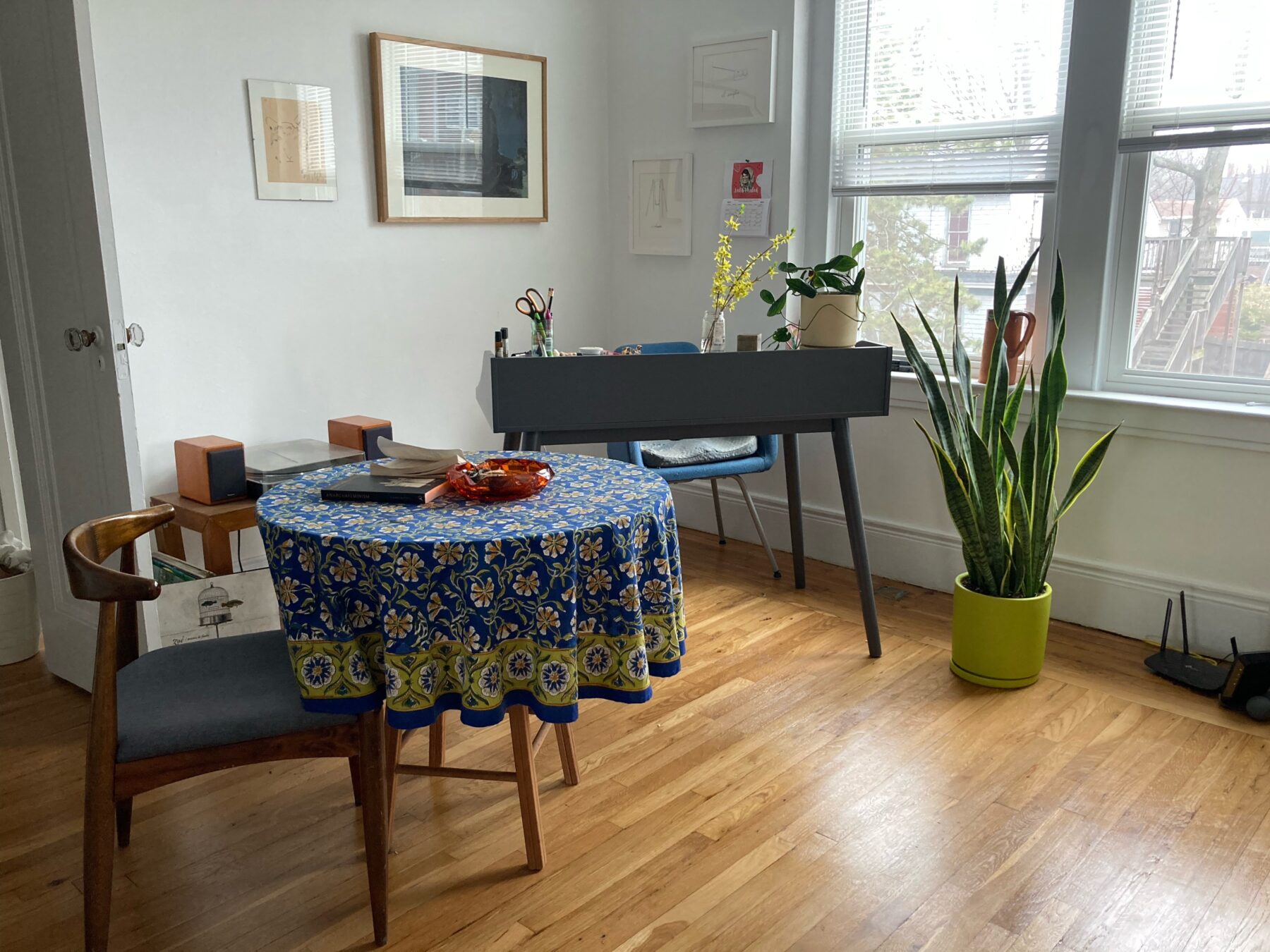
Allis’ work space in downtown New Haven, April 2023.
Throughout the two-thousand tens, Allis’ activism led her to protests at the Texas State Capitol, to the front of makeshift classrooms where eager students learned how to find their cervixes, to the bedside of patients seeking abortions and, eventually, to a class called “Education and Empire” at Yale. That’s where I met Allis.
Twenty-three years after her operation, Allis and I are sitting together at the kitchen table of her apartment in downtown New Haven. On the table between us, an accordion folder bursts with the records of her activism: a laminated guide to forms of birth control, a flier for a queer cumbia dance party, a photocopied diagram titled “aparato reproductor femenino útero”—female reproductive system uterus. A member of the Class of 2025, Allis is an Ethnicity, Race, and Migration major and a full-time healthcare coordinator at Integrated Refugee and Immigrant Services (IRIS) in New Haven.
With a Google Doc full of questions and a half-eaten samosa, I nervously shuffle around and drop my claw clip on the floor, twice. It’s not every day that I ask one of my friends if I can turn a conversation we would usually have over dinner into a formal, on-the-record interview. We decide to start with something familiar: the class we took together last semester.
One day in September, Allis walked out of the classroom halfway through the seminar and didn’t return. I remember the flash of her yellow beanie disappearing through the doorway. When I ask her now why she left that day, she tells me about how tired she was. Allis was overwhelmed, struggling to see the point of continuing classes at Yale. “Going to school seemed unimportant in the grand scheme of things because I was missing my family, my community, I was missing my dogs.” She missed home.
Home, for Allis, extends beyond Laredo, the rural town in South Texas where she grew up. When she thinks about home, she hears the chicharras, the dense whir of the cicadas’ song swelling through “the smell of wet earth after it rains on a hot summer day.” She hears clatters of laughter over the cumbia music drifting between the stucco walls of her house on Mulberry Street in San Antonio. She hears the squeaking of her bike’s ungreased wheels as she rides her bike through Oakland. “There’s this James Baldwin quote…I can’t really remember,” she tells me. We find it later in her dog-eared copy of Giovanni’s Room: “Perhaps home is not a place but simply an irrevocable condition.”
For Allis, education is at the center of the irrevocable condition she calls home. Through the ten years she spent organizing in the reproductive justice movement, she was a student and a teacher. She learned from fellow activists in late-night conversations and cross-legged knowledge-sharing circles. She taught her students reproductive health literacy in living rooms, massage studios, and abortion clinics.
“This is how I started.” Allis gestures to a flier in the middle of the table that advertised what she considers her first foray into mutual aid work as a doula. Under the title, Hojas de Servicio, white flowers bloom on a black background. It reads: “Leaves of Service.” The services Allis offered included massages, consultations on contraceptives, and tutorials to help her clients understand their anatomy. In exchange, she accepted any amount clients could afford to pay, or any item they could barter (on one occasion, three bottles of kombucha). Allis’ flier summarizes her goal: to “make alternative therapies accessible to the San Antonio community who are unable to afford holistic health care.”
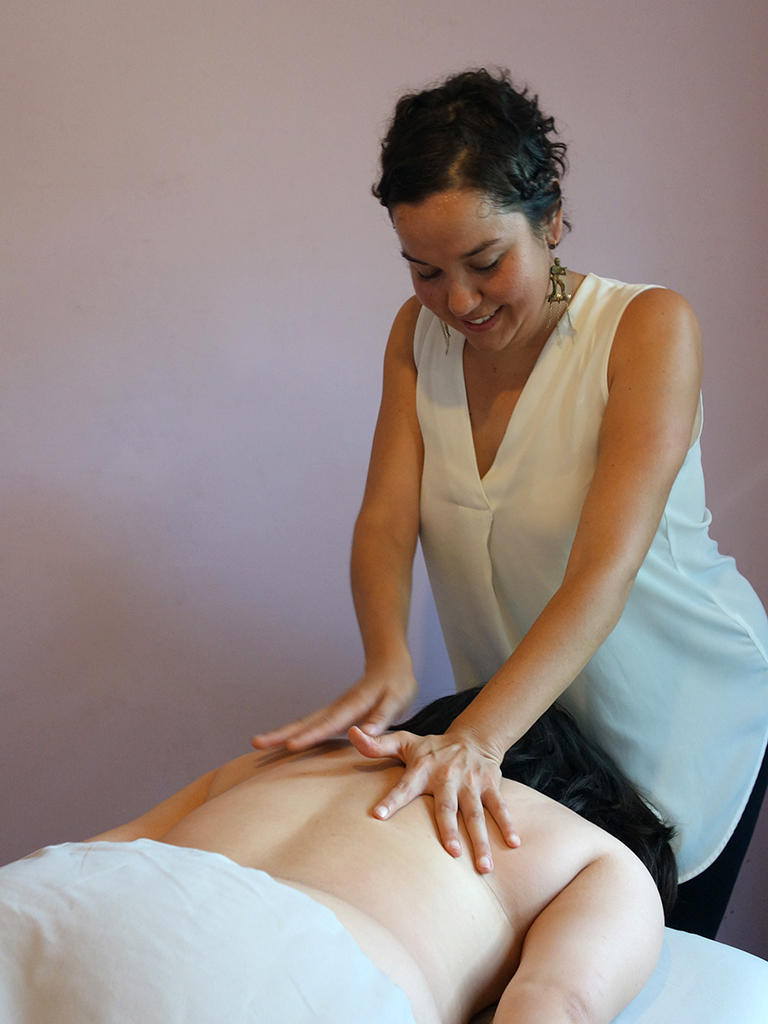
Allis offered massages through Leaves of Service.
Allis launched Hojas de Servicio in 2013 after the Texas State Legislature passed House Bill 2 (HB 2), expanding statewide restrictions on reproductive health care and abortion providers. The ratification unearthed Allis’ memories from that night in the emergency room. “I was reminded of what it felt like to have somebody else tell me what to do with my body,” Allis remembers.
The surgery left Allis with one less ovary and questions that still blink at her like hospital fluorescents through the darkness of her bedroom in the hours before she falls asleep. Why had his first thought been sterilization? Who were his other patients?
The surgery left Allis with one less ovary and questions that still blink at her like hospital fluorescents through the darkness of her bedroom in the hours before she falls asleep. Why had his first thought been sterilization? Who were his other patients?
She wonders, “What happened to the women who didn’t get a chance to speak up?”
These are the questions that guided Allis’ work in the reproductive justice movement. After HB 2’s ratification, the number of women’s healthcare clinics that offered abortions reduced by half in the span of three years, and patients who couldn’t afford healthcare or find a clinic near them sought alternatives. Through her work on Hojas de Servicio, Allis offered an alternative in the form of conversations and pamphlets exchanged between friends with a concrete, practical goal: expanding access to informed health care. Knowledge, in Allis’ view, was something to share.
At Yale, the knowledge that Allis had cherished in her work as an activist took a distorted form. It was compressed into 250-word Canvas discussion posts and castle-side classrooms. Allis found that Yalies trade knowledge, too, but as currency: a well-written paper in exchange for an A, an oozing email in exchange for acceptance to a class.
At Yale, the knowledge that Allis had cherished in her work as an activist took a distorted form. It was compressed into 250-word Canvas discussion posts and castle-side classrooms. Allis found that Yalies trade knowledge, too, but as currency: a well-written paper in exchange for an A, an oozing email in exchange for acceptance to a class. When Allis applied to “Education and Empire” during spring registration in 2022, she was rejected.
According to Professor Talya “TZB” Zemach-Bersin, who teaches “Education and Empire” and lectures in the Education Studies department, there were around ninety applications to the class. On the Fall 2022 Canvas page for “Education and Empire,” prerequisites were listed as “None (Preference for students who have already taken EDST 110)”. Allis had spent a decade teaching health literacy, but had not taken EDST 110, “Foundations in Education Studies,” and she had not expressed an interest in the Education Studies program in her application. A few hours before add/drop period ended, Professor Zemach-Bersin emailed her: there was an open spot. In the second week of the semester, she attended her first class.
“I’ll never forget on my first day TZB said heg– hag– ah, I can’t even pronounce it now! Hegemony.” Allis raised her hand to ask what the word meant, Professor Zemach-Bersin explained, and the class moved on. It seemed like everyone else knew the word, responding quickly with thoughtful connections to the dense readings and other word salads. “I felt immediately that I wasn’t supposed to be in that space.”
After the first day, though, Allis kept coming to class, and eventually got off the waitlist. Every time she stood on Wall Street before class, marshaling the nerve to go inside, she reminded herself that she wanted to learn. And, she reasoned, wasn’t that why she came to Yale in the first place?
Well, part of the reason. In her health advocacy work, she noticed the power knowledge could hold. By the time Allis applied to San Antonio Community College (SAC) in 2018, Allis had worked as a doula for five years, seeing firsthand how information about birth control and obtaining safe abortions could change her clients’ lives. The knowledge she learned and shared in her work as a doula, though, had not earned Allis a stable income. In higher education, she searched for the currency, intellectual and literal, that she needed to build a more financially stable life.
While Allis was studying biology at SAC, the word “teratoma” unboxed a memory. Allis finally grasped the science behind what happened to her in 2000—that her tumor, a teratoma, was born in her reproductive cells. There, the teratoma grew as it collected nearby tissues into a dense mass.
Gathering this information cleared the shame and confusion that had obscured her memories of the surgery. “It was a relief for me.” Beyond relief, Allis began to feel she had control over her understanding of the surgery. At SAC, Allis realized the knowledge that she learned in a higher education space could make her feel powerful.
Encouraged by her experience at SAC, Allis applied to four-year colleges in Texas, wanting to stay close to home. Her top choice was the University of Texas at Austin. But she knew she couldn’t afford to pay for tuition, so she Googled “undergrad for nontraditional students big endowment,” and the Eli Whitney program popped up.
It was the first time Allis had thought about Yale since the nineties, when she watched Jessica’s meltdown after the Ivy League rejected her in the sitcom Saved by the Bell. When Yale accepted Allis with an offer that would cover her tuition and rent, she figured, why not? “I was tired of being broke.”
A year into her time at Yale, Allis felt far away from home and far away from the power in knowledge she found at SAC. She was battling new questions: Why did she come to Yale, and why should she stay here?
These are the questions we mull over while we sit across from each other in Allis’ apartment. The awkwardness of our interview subsides, and we talk about how Allis’ years of reproductive justice work connect to her life as an Eli Whitney student.
After HB 2 passed in 2013, Allis didn’t launch Hojas de Servicio right away. The shape her activism would take was not clear to Allis until she got a call from her friend and reproductive justice activist, Serpentina. Allis met Ser when she was living in California in 2010. Across the dance floor at a West Oakland music festival, Allis saw “this beautiful statuesque person.” Ser stands over six feet, Allis adds, raising her hands over her head to demonstrate: “like, tall.”
“I went up to them and just started dancing with them, and that was the beginning of our friendship,” Allis says. At the time, Allis was training in massage therapy, and Ser was working on their undergraduate thesis at the University of California, Berkeley: “Forced Sterilizations in Peru during the Fujimori Dictatorship.”
Before Allis met Ser, she approached college students with some suspicion. “All throughout my twenties,” Allis remembers, “I was the person basically telling people that college wasn’t needed to measure someone’s intellect.” She perceived a divide between radicals, who learned from their communities, and academics, who learned from a bank of prescriptive knowledge.
“[Ser] was the first academic that I didn’t feel that with,” Allis explains. They were a radical activist who organized against institutional structures of oppression, and they were a sharp critical thinker who leveraged institutional power to achieve their goals.
Allis remembers staying up late with Ser, “talking feministy stuff.” While they were talking about Ser’s research on sterilization, a question that had lingered in Allis’ mind since the night of her surgery resurfaced. If it was possible to save half her reproductive system in the end, why had sterilization been her doctor’s first course of action?
Through her conversations with Ser, Allis learned about the romance between eugenics and reproductive healthcare for Latine patients in America. She learned about the widespread sterilization of Puerto Rican women throughout the twentieth century by doctors who advertised la operación as the only available birth control. She learned about the “twenty thousand patients recommended for sterilization between 1919 and 1953” in California, disproportionately Latine. She learned about how the funding Margeret Sanger and Planned Parenthood provided for the Puerto Rican pill trials in the nineteen-fifties and the history of feminists who dismissed Latine patients’ agency, minimizing the experiences of those who willingly chose sterilization.
Through the lens of her new knowledge, Allis was able to view her brush with sterilization in context of this collective history. With Ser, Allis pieced through these accounts, the current state of sterilizations in the U.S., and the questions that these realities raise about race, gender, and bodily autonomy until the sun turned the Oakland skyline shades of orange.
Allis hoped that, at Yale, she would continue the critical conversations that she had started with Ser in Oakland, but her suspicion toward academia hadn’t subsided. Academia was central to the structures of power that Allis aimed to disrupt through her healthcare advocacy. Yale, she knows, is deeply rooted in these power structures. The American Eugenics Society was headquartered at Yale from 1926 to 1938, and supported legislation that permitted involuntary sterilizations while Yale-educated doctors put law into practice. Allis struggled to see how she would learn at an institution that had endowed students with knowledge they leveraged to harm the communities she had advocated to protect.
The disconnect that Allis perceived between the Eli Whitney program and her “matriarchal, queer, activist, artist” community from Texas deepened her hesitations. She remembers that the first event, a dinner for accepted Eli students, “felt very cis male, hetero, military—just the total opposite of the world I was coming from.”
At that dinner, Allis met Awa, an Eli Whitney student studying Molecular, Developmental, and Cellular Biology. Awa remembers Allis’ “very bubbly,” enthusiastic voice responding, “wow, like water?” when Awa introduced herself. Reflecting on that moment, Allis thinks it’s fitting that Awa’s name translates to water “because she has been like water for me in this experience [at Yale]. She’s been necessary, and I’m so grateful for her and to her.”
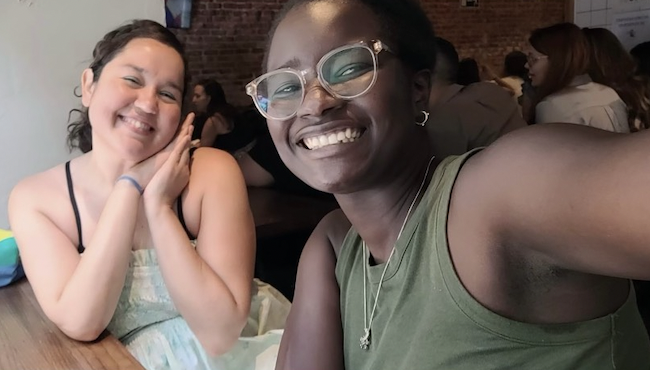
Allis and Awa meet for brunch in the Salamanca district of Madrid, Spain, June 2022.
Awa resonated with Allis’ experience of coming to Yale with knowledge that did not fit a Western standard. Awa had worked as a nurse in Senegal for five years before she immigrated to the U.S. in 2018. Finding that her credentials didn’t transfer to the American medical system, Awa enrolled at Georgia State to study biology. When she noticed a message from the Eli Whitney program in her inbox, she thought it was a spam email. Like Allis, she only knew Yale from American TV dramas where hot, rich teenagers agonize over acceptances.
Bonding over their commitment to healthcare and their confusion about their sudden transformation into Yalies, Allis and Awa became close friends. When Allis is thinking about something she learned in class, when she needs someone to give her a ride, when she needs a sounding board for her frustrations about Yale, she calls Awa. “Awa has been everything for me.”
Allis remembers how Ser captured that “everything” feeling too. More than an academic, Ser was “a punk, an artist, a radical thinker, and [a] critic,” and they were the friend Allis turned to when she felt frustrated and confused after HB 2 was passed.
In July 2013, Ser called Allis with an idea: would Allis help them host a knowledge share? By then, Allis had moved to San Antonio, and Ser flew down from the West Coast to join her. They started planning “Know Yo Self,” a day-long workshop where Allis and Ser taught participants skills for reproductive health literacy, ranging from massage techniques to information about menstruation.
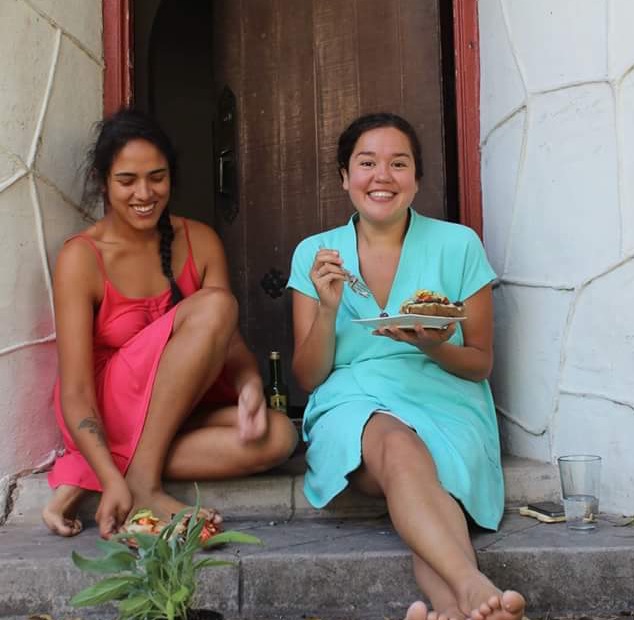
Allis and Ser outside of Allis’ house on Mulberry Street the morning after “Know Yo Self ” in San Antonio, Texas, September 2013.
Of the roughly twenty people who participated in “Know Yo Self,” some were full-time community organizers while others worked at reproductive healthcare clinics. Some had children while others had no interest in becoming parents. Allis describes the community she built around “Know Yo Self” as “tight-knit,” knotted together at the heart of San Antonio by their queerness, and their commitment to making reproductive healthcare accessible.
The group of attendees gathered for “Know Yo Self’s” main activity: a lesson in how to use a speculum to perform a self-exam of their cervixes—the muscular tissue that connects the uterus to the vagina. Some gynecologists advise against checking your cervix, since it can be difficult to understand how the tissue should feel, and doctors will usually perform the exam during regular visits. But for communities that can’t access consistent health care, Allis emphasizes the important gap in knowledge that self-exams can fill. “When you can’t afford to go to the gynecologist,” she explains, people “learn to do things their own way…People are going to stick things in their vagina. People are going to have abortions.”
Allis emphasizes that there can be a risk in a self-driven approach to healthcare if your speculum isn’t sanitized or you don’t understand your anatomy: “That’s why education is so important.” By teaching workshop participants how to examine themselves safely, Allis and Ser offered them practical reproductive health knowledge—the ability to know how their body usually looks and feels, so that when something doesn’t feel right, they can seek help.
At “Know Yo Self,” Allis saw her cervix for the first time, and she cried. “I cried because I was seeing a part of my system that was handled many years before by strangers.” In that moment, Allis’ desire to help members of her community advocate for themselves crystallized. “I wanted people to know what’s going on in their bodies before they let anyone else handle their insides.” The workshop was a turning point for Allis. “It ignited something in me that allowed me to see how much power can be shared in a non-academic way.”
“I wanted people to know what’s going on in their bodies before they let anyone else handle their insides.”
By the time Allis came to Yale, she knew how powerful knowledge could be outside an academic space from her healthcare advocacy as a doula, and she had a sense of how powerful knowledge could be within academia from her experience at SAC. In “Education and Empire,” Allis didn’t find that power again until she read A Third University is Possible by la paperson in late October last semester.
I ask Allis about the book while we sit outside of the Beinecke, a week after our first interview in her apartment. She takes it out of her backpack. Its exterior is unimposing, a bright blue cover holding a thin seventy pages, hardly bigger than my hand. The interior, though, is a dense work of scholarship full of obscure allusions to film theory and sentences like “we have the pitfall of anthropocentrism.” It is the kind of book that Allis would have once dismissed as stuffy philosophy, far removed from the practical knowledge that she considered empowering.
One quote in Allis’ copy is underlined deeply enough to indent the page: “The university is an assemblage. It is a giant machine composed of myriad working parts, multiple systems. Each part can still be thought of as a discrete organism to be unplugged and replugged somewhere else.” In the margin, Allis noted, “Thinking of myself as part of an assemblage…helps ease the mounting pressure of success that this place perpetuates.”
She explains her note to me: “I think ultimately the first weeks I was in TZB’s class…I felt confused because up until that point I had interpreted success in this place on what we see like on the pamphlets and what we see at orientations, becoming the next Ian Shapiro.” When she read the book, the knowledge Allis understood from her life as an activist and the knowledge she learned at Yale clicked into alignment.
“Thinking of myself as just this piece of an assemblage where I can plug and plug whenever I want gave me so much agency.” The pressure Allis felt to fit what she perceived as the Yale version of success lifted. “[The book] kind of gave me my power back.” For Allis, this power resides in her ability to retool the knowledge she absorbs from texts like A Third University is Possible and classes like “Education and Empire” to suit the version of success she strives for in her advocacy.
Now, Allis’ successes branch through New Haven. At IRIS, Allis works with the Services for Undocumented Neighbors team to help immigrants who are new to New Haven navigate the healthcare system. At an academic forum in April, Allis read an introduction for Awa before she presented her biomedical research on malaria. At Professor Zemach-Bersin’s house, Allis throws a ball for TZB’s frenetic boston terrier, Frankie, while they catch up on life and work.
Allis and I became friends after she read A Third University is Possible, when she reached out to me to ask if I wanted to get a coffee. It was early November, and we sat outside of the Blue State behind the business school with our laptops between us, chatting and workshopping ideas for an upcoming paper. By the time we finished talking, Blue State was closed and we were both significantly puffier, having layered on hats and sweaters when the setting sun dragged the temperature down with it.
As we sit outside of the Beinecke five months later, a breeze lifts the warbles of returning birds over the rumble of traffic from York Street. Behind us, the Schwarzman Center announces itself in an incontrovertible wall of stone, but we are too busy to notice, laughing over the story I tell Allis about my first pap smear.
It’s one of the first days of spring, and the leaves are budding.
—Grace Ellis is a sophomore in Benjamin Franklin College.


